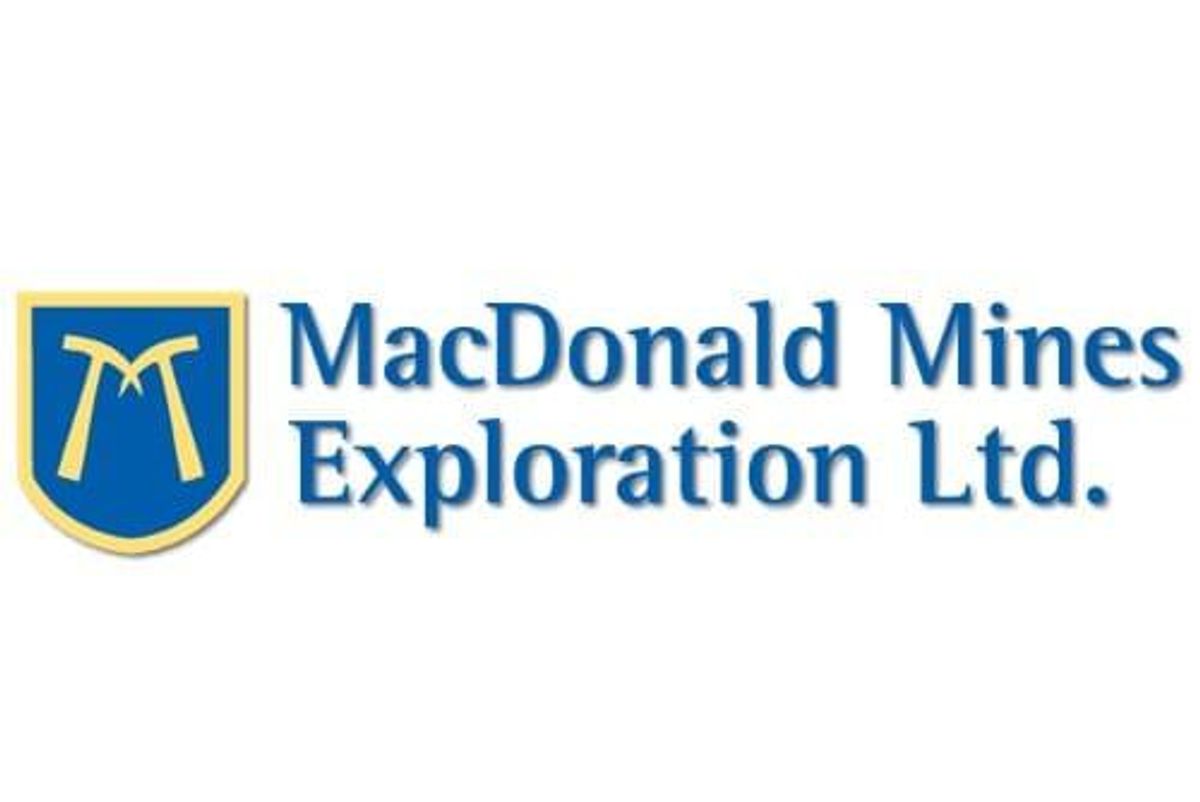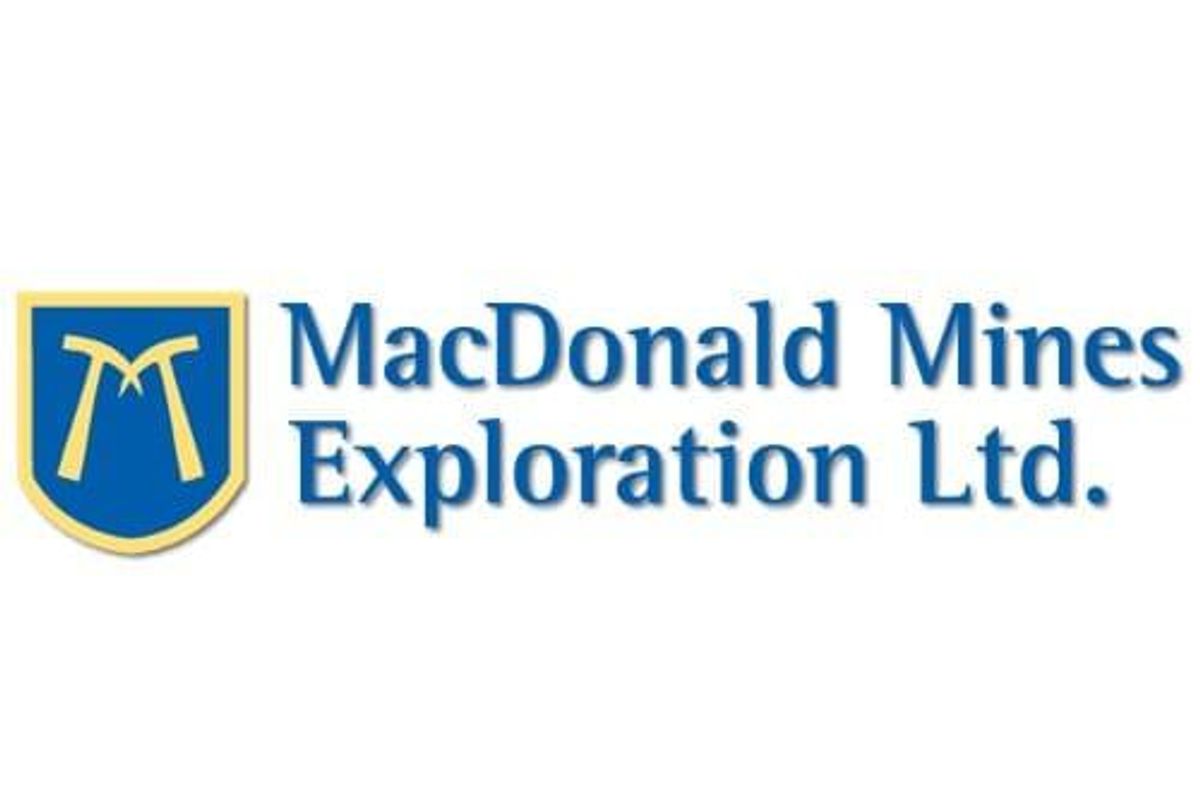
MacDonald Mines Exploration Ltd. (TSX-V: BMK) ("MacDonald Mines", "MacDonald" or the "Company") announces further assay results from its ongoing 14,000 metres 2020 drilling program at the SPJ Property, located 40 km east of Sudbury, Ontario.
Highlights include :
- 3.90 g/t gold over 17.6 metres, including 20.54 g/t gold over 1.00 metre and 17.61 g/t gold over 1.19 metres in hole SD-20-062 and,
- 10.29 g/t over 4.75 metres, including 19.50 g/t gold over 0.92 metres and 10.65 g/t gold over 1.04 metres in SD-20-063
Both holes 62 and 63 targeted the southernmost known extension of gold mineralization in the South Pit area. These latest results suggest that mineralization in the Scadding Mine potentially connects with mineralization in the South Pit area. To date, the high-grade gold mineralization in the Bristol/Monaco corridor extends over a strike length of 400 metres between the North and South pits (Figure 1). MacDonald's drilling focus through December will be on the large exploration gaps that exist between the Scadding underground mine and both the North Pit and South Pit areas.
Figure 1. Longitudinal section showing reported assay results is available at https://www.globenewswire.com/NewsRoom/AttachmentNg/a0a1d2db-c4ec-40c8-9164-6ce8ebe64a94
Quentin Yarie, MacDonald's President and CEO stated, " As we continue our 2020 drilling program, these latest results indicate that the Bristol / Monaco deformation zone forms the most favo u rable geological target to expand the Scadding Deposit . We have now uncover ed several new areas and drill targets for potential high-grade gold mineralization in this zone . We will also look to expand the potential around the South Pit area with drilling through to the end of the year. "
" Holes 50 to 5 5 t argeted the newly discovered Monza fold structure southeast of the Scadding Mine . While little gold mineralization was intersected in the samples received to date, all five holes show alteration and structures characteristic of the Scadding Deposit . Once results from all pending samples are received, we will be able to evaluate what f ollow - up work i s required in the Monza Structure and identify future drilling targets in the area . "
Table 1. Assay highlights from reported holes
| Hole | From (m) | To (m) | Length* (m) | Visible Gold Observed | Gold (g/t) | ||
| Standard assay (half core) | Check assay (quarter core) | ||||||
| SM-20-047 | 57.16 | 60.00 | 2.84 | 0.70 | |||
| 78.35 | 80.26 | 1.91 | yes | 1.23 | |||
| SM-20-048 | 133.47 | 137.10 | 3.63 | yes | 1.54 | ||
| including | 134.30 | 135.13 | 0.83 | yes | 0.70 | 9.04 | |
| and | 136.11 | 137.10 | 0.99 | yes | 4.36 | 7.17 | |
| SM-20-049 | 31.82 | 43.62 | 11.80 | 0.71 | |||
| 49.14 | 51.73 | 2.59 | yes | 1.34 | |||
| including | 49.91 | 50.68 | 0.77 | yes | 2.79 | 5.71 | |
| SM-20-050 | No significant results | ||||||
| SM-20-051 | No significant results | ||||||
| SM-20-052 | No significant results | ||||||
| SM-20-053 | No significant results | ||||||
| SM-20-054 | No significant results | ||||||
| SM-20-055 | No significant results | ||||||
| SM-20-062 | 30.00 | 47.06 | 17.06 | yes | 3.90 | ||
| including | 30.88 | 32.19 | 1.31 | yes | 7.38 | ||
| and | 39.40 | 40.40 | 1.00 | 20.54 | |||
| and | 42.55 | 43.74 | 1.19 | 17.61 | |||
| SM-20-063 | 43.14 | 47.89 | 4.75 | yes | 10.29 | ||
| including | 43.14 | 44.14 | 1.00 | yes | 7.24 | 1.12 | |
| and | 45.08 | 46.00 | 0.92 | 19.50 | |||
| and | 46.00 | 47.04 | 1.04 | 10.65 | |||
| and | 47.04 | 47.89 | 0.85 | yes | 9.82 | ||
* Assay results presented over core length. They are estimated to represent 75-85% of true width.
Re- A ssaying of I ntersections with Visible Gold
Building on MacDonald's past experience with "the nugget effect" at the Scadding Deposit, the Company re-analyzed some of the intersections where visible gold was observed in the North and South Pit areas. Both sets of assays (where applicable) are shown in Table 1. One sample is from half of the core, which is consistent with CIM Mineral Exploration Best Practice Guidelines, whereas the "Check assay" is from quarter core. The latter is presented here to illustrate the range of variability of the gold grade within the same core sample.
MacDonald recognizes that quarter core sampling is not consistent with CIM Mineral Exploration Best Practice Guidelines. However, the volume of rock represented by one quarter of HQ diameter drill core, the core size used by MacDonald, is equivalent to 89% of the volume of rock represented by one half of NQ diameter drill core. NQ drill core is the current industry standard for mineral exploration.
This comparison indicates that the volume of rock in one quarter of HQ diameter drill core remains representative of the mineralization zone, and the Company considers that the grade variability illustrated by the quarter core samples is of interest for the accurate quantification of the core's gold content. It is also important to note that this process is a standard method utilized to confirm assays when an independent party is calculating a resource estimate.
Table 2. Coordinates of report ed holes
| Hole ID | Easting | Northing | Elevation | Azimuth | Dip | Depth (m) |
| SM-20-047 | 529208 | 5166659 | 311.4 | 301 | -57 | 94 |
| SM-20-048 | 529224 | 5166682 | 309.2 | 187 | -66 | 157 |
| SM-20-049 | 529165 | 5166661 | 310.7 | 298 | -45 | 112 |
| SM-20-050 | 529655 | 5166442 | 290.4 | 204 | -48 | 160 |
| SM-20-051 | 529730 | 5166396 | 289.26 | 220 | -45 | 136 |
| SM-20-052 | 529739 | 5166442 | 294.3 | 219.9 | -60 | 184 |
| SM-20-053 | 529781 | 5166457 | 289.0 | 214.6 | -45 | 181 |
| SM-20-054 | 529781 | 5166459 | 291.1 | 215 | -56 | 181 |
| SM-20-055 | 529769 | 5166395 | 289.2 | 220 | -45 | 124 |
| SM-20-056 | 529343 | 5166511 | 313.7 | 145 | -45 | 124 |
| SM-20-062 | 529186 | 5166356 | 306.4 | 245 | -50 | 142 |
| SM-20-063 | 529188 | 5166356 | 306.4 | 215 | -75 | 106 |
Detailed Description
To date the Company has completed more than 7,000 metres of drilling in its ongoing 14,000 metres 2020 drilling program (Figure 2).
Figure 2 . Drilling to date and assay highlights is available at https://www.globenewswire.com/NewsRoom/AttachmentNg/d3bdac6b-effb-44e7-a104-5a78d05dd0c9
Hole SM-20-0 4 7 was testing the continuity of the Bristol/Monaco Structure between SM-19-001 and SM-19-004. It successfully intersected two zones of strong chlorite alteration characteristic of the Scadding Deposit, including one with visible gold, but these zones of chlorite alteration did not contain significant gold mineralization.
Hole SM-20-0 4 8 was testing the interpreted projection at depth of the Bristol/Monaco Structure, 30 metres south of the gold intersection in SM-20-035 (4.4 g/t gold over 4.80 m – see news release of May 1 1 , 2020 ). The hole intersected the extension of the structure and strong chlorite alteration with two occurrences of visible gold in the intersection.
Hole SM-20-0 49 was testing the extension of the chlorite zones of the North Pit, west of a diabase dyke, that crosscut mineralization in the North Pit area. The hole intersected two zones of chlorite alteration and shows that gold mineralization associated with chlorite alteration remains open to the northwest of the diabase dyke.
Hole s SM-20-050 to SM-20-0 5 5 were testing the Monza fold structure, at the contact between the Serpent and Espanola formation, in the extensions of the zone discovered in SM-20-046 and modelled with IP. The holes successfully intersected strong magnetite alteration, chlorite alteration and extensive zones of pyrite with accessory chalcopyrite mineralization that are characteristic of the Scadding Deposit. However, results from samples received do not contain significant gold mineralization. While this indicates that IP is successfully tracing the alteration system that can host significant zones of gold mineralization, MacDonald is refining the systematic relationship between the induced polarization and resistivity measurements to better identify where gold mineralization may be present.
Hole SM-20-056 was testing mineralization in the Villeneuve Structure near the New Zone of the Scadding Deposit, an area located between the Scadding Mine and the E-W Pit. The hole did not intersect significant chlorite alteration nor gold mineralization.
Hole SM-20-062 was testing the outer edge of the known extension of gold mineralization in the South Pit area, in an area that had not been densely drilled by previous operators. The hole targeted the southernmost known extension of the Bristol/Monaco Structure before its intersection with the Espanola limestone and the projected bend of gold mineralization in an E-W orientation. It successfully intersected a significant zone of strong chlorite alteration that is associated with gold mineralization.
Hole SM-20-06 3 was testing the extension of gold mineralization intersected in SM-20-062 in the South Pit area, again in an area that had not been densely drilled previously by other operators. The hole targeted the southernmost known extension of the Bristol/Monaco Structure before its intersection with the Espanola limestone. It successfully intersected a significant zone of strong chlorite alteration that is associated with gold mineralization.
On-site Quality Assurance/Quality Control ("QA/QC") M easures
Drill core samples were transported in security-sealed bags for analyses to Actlabs in Ancaster, Ontario. Individual samples are labeled, placed in plastic sample bags and sealed. Groups of samples are then placed into durable rice bags and then shipped. The samples transported to Actlabs were dropped in rice bags with security seals by Manitoulin Transport. The remaining coarse reject portions of the samples remain in storage in case further work or verification is needed.
MacDonald has implemented a quality-control program to comply with best practices in the sampling and analysis of drill core. As part of its QA/QC program, MacDonald inserts external gold standards (low to high grade) and blanks every 20 samples in addition to random standards, blanks, and duplicates. All samples over 10 g/t gold or the samples with abundant visible gold are analysed by 1 kilogram metallic screen. Check assays are routinely performed for samples with visible gold to ascertain the gold content of the mineralization zone.
SPJ Property H ighlights
- 100% ownership
- 18,340 hectares in excellent mining jurisdiction and close to infrastructure
- Hosts the high-grade past producing Scadding Gold Mine
- Evidence of polymetallic mineralization at the Scadding Deposit indicative of IOCG potential
- Significant gold, cobalt, copper, silver, nickel and rare earth showings outside of the Scadding Deposit footprint
Historically, the Scadding Mine produced 914 kilograms of gold from 127,000 tonnes of mineralized material grading 7.2 g/t (OFR 5771). MacDonald's reinterpretation of the geological model at the Scadding Deposit and larger SPJ property indicates that it could host a gold-rich Iron-Oxide-Copper-Gold deposit and that significant gold structures may have been missed by previous operators' drilling campaigns (2009-2011).
Qualified Person
Quentin Yarie, P Geo., CEO and President of MacDonald Mines and the Qualified Person as defined by National Instrument 43-101 has reviewed and approved the technical information in this news release.
COVID-19 Precautions
MacDonald Mines has developed and implemented precautions and procedures that are compliant with Ontario's health guidelines. Strict protocols are in place to ensure the safety of all staff, thereby reducing the potential for community contact and spreading of the virus.
About MacDonald Mines Exploration Ltd.
MacDonald Mines Exploration Ltd. is a mineral exploration company headquartered in Toronto, Ontario focused on gold exploration in Canada. The Company is focused on developing its large SPJ Project in Northern Ontario.
The Company's common shares trade on the TSX Venture Exchange under the symbol "BMK".
To learn more about MacDonald Mines, please visit www.macdonaldmines.com
For more information, please contact:
Quentin Yarie, President & CEO, (416) 364-4986, qyarie@macdonaldmines.com
Or Mia Boiridy, Investor Relations, (416) 364-4986, mboiridy@macdonaldmines.com
Neither TSX Venture Exchange nor its Regulation Services Provider (as that term is defined in the policies of the TSX Venture Exchange) accepts responsibility for the adequacy or accuracy of this release.
This News Release contains forward-looking statements. In some cases, you can identify forward-looking statements by terminology such as "may", "should", "expects", "plans", "anticipates", "believes", "estimates", "predicts", "potential" or "continue" or the negative of these terms or other comparable terminology. These statements are only predictions and involve known and unknown risks, uncertainties and other factors that may cause our or our industry's actual results, levels of activity, performance or achievements to be materially different from any future results, levels of activity, performance or achievements expressed or implied by these forward-looking statements.
Although the Company believes that the assumptions and factors used in preparing the forward-looking information in this news release are reasonable, undue reliance should not be placed on such information, which only applies as of the date of this news release. The Company disclaims any intention or obligation to update or revise any forward-looking information, whether as a result of new information, future events or otherwise, other than as required by law.






